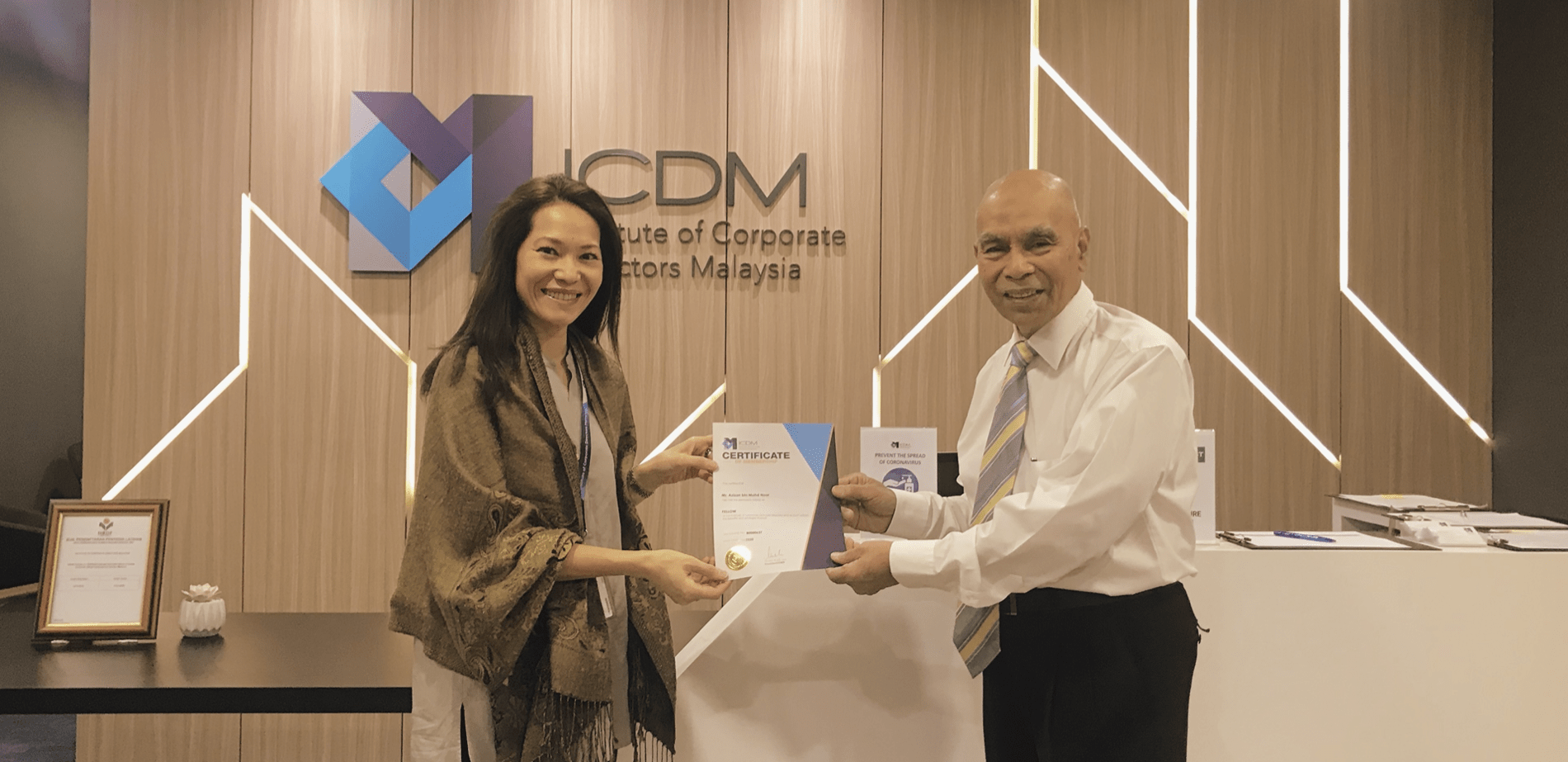An interview with Jia Lih Lu, an ICDM board-ready talent. She talks about doing business in different geo-political situations, working with young people and how the board can help a company survive in difficult times.
Could you tell us more about yourself? You had spent close to four decades in Petronas. How had your career evolved over the years? In 1982, a wide-eyed fresh graduate of 22 years old stepped into a job interview for trainee executive in Petronas. Before I could warm up the chair, the interviewers told me to go home as they were looking for a differently qualified candidate. Well, I thought that was not fair and so I told them in no uncertain terms that they have had the chance to look through my qualification earlier and they could have told me in advance if they were not interested. Despite this awkwardness, we continued with the interview for the next two hours. Three weeks later, I received the official offer from Petronas and therefrom started my almost four-decade long commitment to Petronas.
I was first assigned to the International Marketing Division where I gathered in-depth knowledge and experience in marketing, trading, logistics, shipping, refining, planning, budgeting, and risk management of petroleum products and crude oils. I eventually led a team of marketers and traders in our internationalisation efforts. I was here for 15 years.
In 1997, I was brought into the world of LNG (liquefied natural gas) as the General Manager for marketing. Throughout the next nine years, I had to adopt and adapt skills in time management, people management, risk assessment, and sustainability challenges as we embarked to launch the MLNG Tiga Project. These gave me on-the-ground exposures in the ASEAN, European, American and Australasian markets and I appreciated how businesses are intertwined with their working and social cultures.
Subsequently, after a stint in PETRONAS Chemicals Group Berhad (PCGB) where I managed polymer business and international operations, I was exposed to retail businesses in PETRONAS Dagangan Berhad (PDB), the domestic and key branding arm of Petronas. It was during this period from 2010-2017 that I was posted to Vietnam and The Philippines. In performing my duties as CEO of some subsidiary companies, I acquired hands-on experience in mergers, acquisitions and divestments as we consolidated our business portfolio abroad after intense audit reviews on business performance and governance.
37 years on, to end my journey in Petronas, I assisted in developing markets and marketing frameworks for a totally new business in PCGB – Specialty Chemicals. This has introduced a new mindset for me and my team to step out of our comfort zone. As the business landscape evolves, it compels our business entities to think out of the box.
“Wherever we set foot to conduct our business, it is important to practise prescribed values in the like of integrity, professionalism, courage and loyalty.”
You were exposed to different geo-political situations and cultural sensitivities in your long career in Petronas. The world is seemingly growing more divided with the rise of nationalist policies. How do you think this would affect business? And what should companies look out for especially those that have operations in multiple countries? Every economy operates on the premise of their socio-economic foundations, their geo-political backgrounds, their lifestyles, cultures, religion and history. As long as laissez-faire is allowed to exist alongside capitalism, business can thrive. However, one must always have its business values ingrained as we operate abroad, for we are also “ambassadors” of our countries. This is where we have to inculcate a value system in our business philosophy. Wherever we set foot to conduct our business, it is important to practise prescribed values in the like of integrity, professionalism, courage and loyalty.
Employees must be trained on the true meaning of each value and how it can be implemented in our trades with the locals. There will be challenges deterring or even preventing us from practising all these values, but the leaders must show exemplary attitudes. Rules should be made clear and visible to each employee on the expectations of the company on abidance to these rules. And there should be consequential management to non-compliance.
Another business philosophy that should not be forgotten is “Give Back”. As we enter another country’s soils, we are also encroaching into their resources. Therefore, to ensure a cordial and co-operative environment, it is always recommended that Corporate Social Responsibility (CSR) be constantly practised. Such philanthropic and charitable aspects are vital for our business existence. Besides being sensitive to local needs, we must also observe the laws of the land and ensure our business competes fairly in the markets.
You mentioned to us previously that increasingly more companies are being managed by younger executives. Age diversity in the boardrooms is also an increasing priority for good corporate governance. How do you think that would change boardroom dynamics and how to strike a balance? Similar to gender, qualification and experience, age diversity is just as important when considering board composition. The outlook, thought process, ideas for business development and growth, management styles, habits and lifestyle, and the energies between the younger and the older generations are very different. The age-old adage “generation gap” proves the existence of such differences and they should not be ignored.
As a society progresses, many aspects of our lives evolve and henceforth, methodologies and practices should also adapt to the evolution. As such, isn’t it wiser to include the young who may have new solutions to old issues? They may also have smarter and quicker ways to cope with the fast-changing business landscape.
Having said that, the experience accumulated by the elders is also priceless. They have the “gut feel” that comes from their multiple exposure to real life challenges which the young may not have the chance to go through yet. So, when the young and the elders come together to have an intellectual discussion on a future-proof plan, I believe the results would be impactful.
“…when the young and the elders come together to have an intellectual discussion on a future-proof plan, I believe the results would be impactful.”
To safeguard a company’s future, its leaders must pay attention to its approaches to Environmental, Social & Governance (ESG) issues. What is your take on this? How can the board be an effective driver of a company’s ESG effort? This unprecedented war against Covid-19 has given rise to new challenges. Disruption of the supply chain and effective distribution has surfaced unexpectedly. As a result, businesses collapse, and the economy suffers. The question of resilience and the need of readily available business continuity plans are imminent.
Many companies have been caught unaware. There is an urgent need for companies to re-assess their risk profile, revamp the company’s work rules and performance measurements, develop a more resilient mentality, undertake measures to control leakages, and put into order new normal practices that are functional.
The board can set the direction for management to increase their awareness of the role of social media and the speed of the onset of reputational risks. Direct the concerns of return to work protocols to avoid value leakages and create calls for post-Covid funding and support aimed towards environmentally positive initiatives. Address the work protocols for international operations and intensify health and safety measures.
All aspects of the usual running of an enterprise have to be re-looked to ensure survival and sustainability. This is where the board members can draw on its wisdom to direct and support the company.
“All aspects of the usual running of an enterprise have to be re-looked to ensure survival and sustainability. This is where the board members can draw on its wisdom to direct and support the company.”
Lastly, what drives you to join ICDM as a member and how has the membership benefited your board journey so far? ICDM is well established and is renowned for its good work. It is a natural choice for aspiring board-ready members. The professionalism demonstrated by the staff and the management team is highly commendable. Support staff is ever so friendly and helpful.
I am also happy to note that ICDM does not just rely on the CV submitted but requires its members to undergo intensive assessment and screening tests conducted by independent and experienced assessors. This is evidence of its professionalism and independence, with a well-managed pool of high-quality director talents.
In the last few months, despite being impacted by the Movement Control Order (MCO), I am thankful that ICDM had conducted numerous webinars during this period. The topics chosen were totally relevant and interesting. The speakers invited were experts in their fields, the webinar platform was uncomplicated to use and, last but not least, their moderator was excellent too. I have attended and enjoyed all these webinars and hope ICDM will continue with this practice, despite the relaxed MCO conditions.
Another aspect that I am also pleased to observe is the collaboration between ICDM, 30% Club Malaysia and LeadWomen in driving the diversity agenda.
So, why not ICDM?
Jia Lih Lu had spent close to four decades in Petronas and has accumulated a wealth of experience working in different functional roles in multiple markets. She had served on several company boards since 2003 and looks forward to continue contributing her knowledge and skills.

 4.2
4.2 













